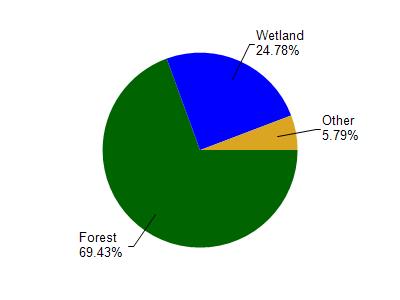Forest
Yes
Yes
No
Fish and Aquatic Life
Historical Description
The Pine River originates in central Forest County. It flows eastward through Forest and central Florence County to its juncture with the Menominee River. The Pine River is a state wild and scenic river.
Date 1993
Author Surface Water Inventory Of Wisconsin
Recommendations
Educate and engage residents
Northwood's Land Trust, Inc. proposes to conduct a direct mail education campaign with all property owners on the priority river and stream segments in Florence County that were identified by the DNR Northern Rivers Initiative. An information packet will be provided highlighting voluntary conservation options those property owners can utilize to protect the priority stream corridors. Those options include conservation easements, land donation, land registry and conservation buyer programs. Individual on site property assessments and conservation planning will be conducted with any landowners who express interest. The project includes the following goals: 1) Direct mail information packets describing voluntary conservation options private landowners can utilize to protect their properties. This information will include how the options can protect land while also providing income, estate and other tax benefits to landowners. The mailing will include all private property owners with at least 500 feet of natural shoreline on these priority river segments; 2) Conduct on-site follow-up contacts with interested landowners as generated by mailing and media publicity; 3) Encourage interested landowners to voluntarily enter into perpetual land protection agreements or utilize other land protection tools to protect their priority river/stream segments. Project deliverables include: 1) Copies of color GIS maps of each of the towns with digitized parcel maps will be provided to illustrate the parcels/landowners identified within 500 + feet of existing natural shoreline frontage; 2) A generalized listing of Florence County landowner follow-up contacts by program type will be provided.
Management Goals
Wisconsin's Water Quality Standards provide qualitative and quantitative goals for waters that are protective of Fishable, Swimmable conditions [Learn more]. Waters that do not meet water quality standards are considered impaired and restoration actions are planned and carried out until the water is once again fishable and swimmable
Management goals can include creation or implementation of a Total Maximum Daily Load analysis, a Nine Key Element Plan, or other restoration work, education and outreach and more. If specific recommendations exist for this water, they will be displayed below online.
Monitoring
Monitoring the condition of a river, stream, or lake includes gathering physical, chemical, biological, and habitat data. Comprehensive studies often gather all these parameters in great detail, while lighter assessment events will involve sampling physical, chemical and biological data such as macroinvertebrates. Aquatic macroinvertebrates and fish communities integrate watershed or catchment condition, providing great insight into overall ecosystem health. Chemical and habitat parameters tell researchers more about human induced problems including contaminated runoff, point source dischargers, or habitat issues that foster or limit the potential of aquatic communities to thrive in a given area. Wisconsin's Water Monitoring Strategy was recenty updated.
Grants and Management Projects
Monitoring Projects
| WBIC | Official Waterbody Name | Station ID | Station Name | Earliest Fieldwork Date | Latest Fieldwork Date | View Station | View Data |
|---|
| 650300 | Pine River | 10036645 | Pine River - Area of Open Water | | | Map | Data |
|

Watershed Characteristics
Pine River is located in the Pine River watershed which is 342.57 mi². Land use in the watershed is primarily forest (69.50%), wetland (24.80%) and a mix of open (3.20%) and other uses (2.60%). This watershed has 348.02 stream miles, 6,893.46 lake acres and 35,145.32 wetland acres.
Nonpoint Source Characteristics
This watershed is ranked Low for runoff impacts on streams, Medium for runoff impacts on lakes and Low for runoff impacts on groundwater and therefore has an overall rank of Low. This value can be used in ranking the watershed or individual waterbodies for grant funding under state and county programs.However, all waters are affected by diffuse pollutant sources regardless of initial water quality. Applications for specific runoff projects under state or county grant programs may be pursued. For more information, go to surface water program grants.